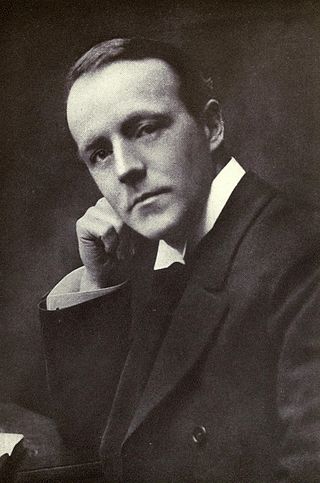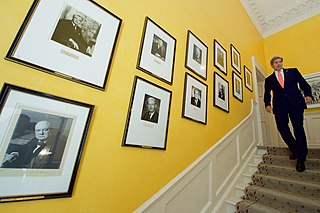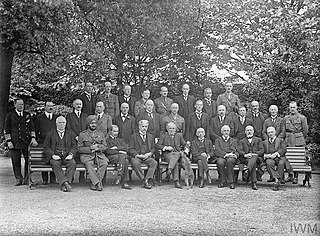
The Liberal Party was one of the two major political parties in the United Kingdom, along with the Conservative Party, in the 19th and early 20th centuries. Beginning as an alliance of Whigs, free trade–supporting Peelites, and reformist Radicals in the 1850s, by the end of the 19th century, it had formed four governments under William Gladstone. Despite being divided over the issue of Irish Home Rule, the party returned to government in 1905 and won a landslide victory in the 1906 general election.

David Lloyd George, 1st Earl Lloyd-George of Dwyfor, was Prime Minister of the United Kingdom from 1916 to 1922. A Liberal Party politician from Wales, he was known for leading the United Kingdom during the First World War, for social-reform policies, for his role in the Paris Peace Conference, and for negotiating the establishment of the Irish Free State. He was the last Liberal Party prime minister; the party fell into third-party status shortly after the end of his premiership.

Herbert Henry Asquith, 1st Earl of Oxford and Asquith,, generally known as H. H. Asquith, was a British politician and statesman who served as Prime Minister of the United Kingdom from 1908 to 1916. He was the last Liberal Party prime minister to command a majority government, and the most recent Liberal to have served as Leader of the Opposition. He played a major role in the design and passage of major liberal legislation and a reduction of the power of the House of Lords. In August 1914, Asquith took Great Britain and the British Empire into the First World War. During 1915, his government was vigorously attacked for a shortage of munitions and the failure of the Gallipoli Campaign. He formed a coalition government with other parties but failed to satisfy critics, was forced to resign in December 1916 and never regained power.

The Cabinet of the United Kingdom is the senior decision-making body of His Majesty's Government. A committee of the Privy Council, it is chaired by the Prime Minister and its members include Secretaries of State and other senior ministers. Members of the Cabinet are appointed by the Prime Minister and are by convention chosen from members of the two houses of the Parliament of the United Kingdom, the House of Commons and the House of Lords. The Cabinet is now made up almost entirely of members of the House of Commons.

Andrew Bonar Law, PC was a British statesman and Conservative politician who served as Prime Minister of the United Kingdom from October 1922 to May 1923.

The Secretary of State for War, commonly called War Secretary, was a secretary of state in the Government of the United Kingdom, which existed from 1794 to 1801 and from 1854 to 1964. The Secretary of State for War headed the War Office and was assisted by a Parliamentary Under-Secretary of State for War, a Parliamentary Private Secretary who was also a Member of Parliament (MP), and a Military Secretary, who was a general.
A national unity government, government of national unity (GNU), or national union government is a broad coalition government consisting of all parties in the legislature, usually formed during a time of war or other national emergency. A unity government lacks opposition, or opposition parties are too small and negligible.

The 1922 United Kingdom general election was held on Wednesday 15 November 1922. It was won by the Conservative Party, led by Prime Minister Andrew Bonar Law, which gained an overall majority over the Labour Party, led by J. R. Clynes, and a divided Liberal Party.
A war cabinet is a committee formed by a government in a time of war to efficiently and effectively conduct that war. It is usually a subset of the full executive cabinet of ministers, although it is quite common for a war cabinet to have senior military officers and opposition politicians as members.
In the United Kingdom, the word liberalism can have any of several meanings. Scholars primarily use the term to refer to classical liberalism. The term can also mean economic liberalism, social liberalism or political liberalism. It can simply refer to the politics of the Liberal Democrats, a UK party formed from the merger of two centrist parties in 1988. Liberalism can occasionally have the imported American meaning; however, the derogatory connotation is much weaker in the UK than in the US, and social liberals from both the left and right wing continue to use liberal and illiberal to describe themselves and their opponents, respectively.

Walter Runciman, 1st Viscount Runciman of Doxford, was a prominent Liberal and later National Liberal politician in the United Kingdom. His 1938 diplomatic mission to Czechoslovakia was key to the enactment of the British policy of appeasement of Nazi Germany preceding the Second World War.

The Shell Crisis of 1915 was a shortage of artillery shells on the front lines in the First World War that led to a political crisis in the United Kingdom. Previous military experience led to an over-reliance on shrapnel to attack infantry in the open, which was negated by the resort to trench warfare, for which high-explosive shell were better suited. At the start of the war there was a revolution in doctrine: instead of the idea that artillery was a useful support for infantry attacks, the new doctrine held that heavy guns alone would control the battlefield. Because of the stable lines on the Western Front, it was easy to build railway lines that delivered all the shells the factories could produce. The 'shell scandal' emerged in 1915 because the high rate of fire over a long period was not anticipated and the stock of shells became depleted. The inciting incident was the disastrous Battle of Aubers, which reportedly had been stymied by a lack of shells.

The article lists the records of prime ministers of the United Kingdom since 1721.

The Asquith coalition ministry was the Government of the United Kingdom under the Liberal prime minister H. H. Asquith from May 1915 to December 1916. It was formed as a multi-party war-time coalition nine months after the beginning of the First World War but collapsed when the Conservative Party withdrew.

Liberal David Lloyd George formed a coalition government in the United Kingdom in December 1916, and was appointed Prime Minister of the United Kingdom by King George V. It replaced the earlier wartime coalition under H. H. Asquith, which had been held responsible for losses during the Great War. Those Liberals who continued to support Asquith served as the Official Opposition. The government continued in power after the end of the war in 1918, though Lloyd George was increasingly reliant on the Conservatives for support. After several scandals including allegations of the sale of honours, the Conservatives withdrew their support after a meeting at the Carlton Club in 1922, and Bonar Law formed a government.

Robert Munro, 1st Baron Alness,, was a Scottish lawyer, judge and Liberal politician. He served as Secretary for Scotland between 1916 and 1922 in David Lloyd George's coalition government and as Lord Justice Clerk between 1922 and 1933.

The Liberal government of the United Kingdom of Great Britain and Ireland that began in 1905 and ended in 1915 consisted of two ministries: the first led by Henry Campbell-Bannerman and the final three by H. H. Asquith.
This article documents the career of Winston Churchill in Parliament from its beginning in 1900 to the start of his term as Prime Minister of the United Kingdom in World War II.
In British politics, a Whig government may refer to the following British governments administered by the Whigs:
Conservative or Tory government may refer to:











